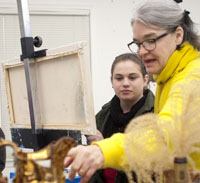Why I Give: Q&A With Betsy Crighton '67

Betsy Crighton '67
Tell us a little about your life today.
I retired three years ago after many years on the faculty at Pomona College. I still live in Claremont, but instead of going to campus every day, I travel, sing in the college choir and enjoy lots of musical performances—especially Friday morning concerts of the Los Angeles Philharmonic. What a treat to go to a concert on a work day! Living in a college town offers easy access to campus events (Claremont has eight colleges and universities). I also enjoy Pilates, hiking and keeping up with family and friends. Volunteering—especially serving on Randolph's Board of Trustees—is a new and important part of my life.
What is your fondest memory from the College?
I have many fond memories of Randolph-Macon Woman's College, especially of superb teachers and deep friendships. Facebook and reunions remind me of how much I share with other R-MWC graduates, some of whom are very close friends. One of my strongest memories is the pleasure and privilege of living among paintings from the College's art collection. Art wasn't rarefied high culture but part of our daily life. We passed the famous Bellows painting on our way to class (sometimes dressed in pajamas under a raincoat). Works by Ben Shahn and Georgia O'Keeffe were part of our world. It is good to see that tradition alive and well on campus today.
What was your favorite tradition?
It isn't my favorite (that would be the faculty talent show), but the honor system is the tradition I value most. It gives ethical shape to life at Randolph. That is one of the College's important strengths, now more than ever.
Why do you support the College with a planned gift?
For years after graduation, I wasn't very close to the College, but I did attend my 25th and 50th class reunions. The 50th was a revelation. During that weekend on campus, I realized that Randolph is still the college I love. It has a new student profile and a new name, but it is still a welcoming, academically rigorous, intellectual community. It is also blessed with wise leadership. I give so that new generations will have access to an education as fine as the one I was given.
Why is it important for people to give to Randolph?
Randolph's future depends on a strong alumni base. Every donation, no matter how small, boosts the alumni giving rate that is so crucial to attracting large gifts and foundation grants. No college or university can charge students for the full cost of their education, so Randolph's ability to maintain and improve the campus, pay reasonable faculty salaries and offer scholarship aid to students all depends on the generosity of graduates and friends.
What advice would you give to a new graduate?
Explore, take risks, tackle tough problems with the knowledge that Randolph has equipped you to think your way through new challenges. Remember that your college education is a precious gift, so stay connected to college friends and mentors and give back along the way.
To learn more about ways to give, please contact the Planned Giving Office at 434-485-8050 or plannedgiving@randolphcollege.edu.

